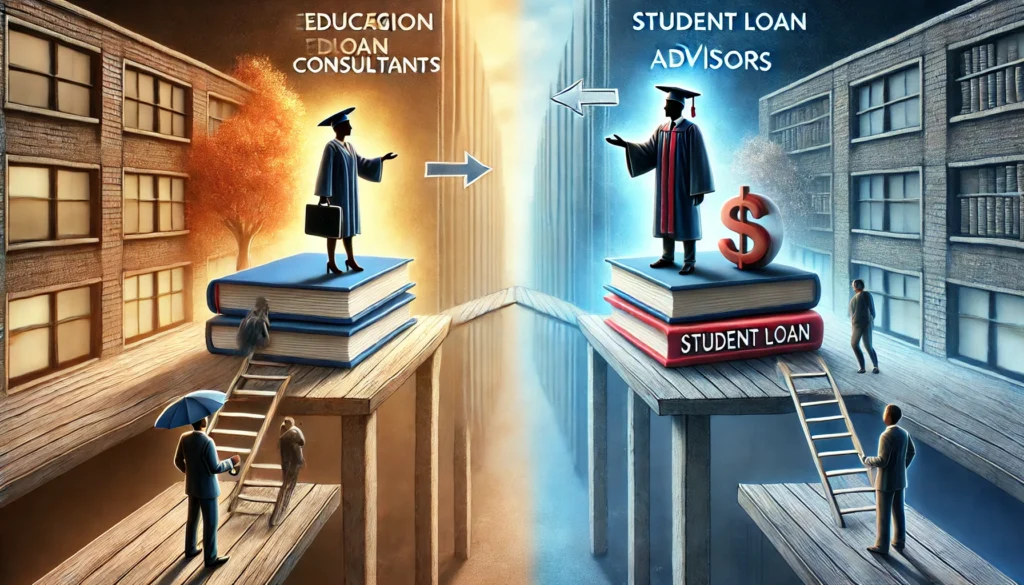Understanding the Role of College Education Loan Consultants
Navigating the complexities of student loans can be overwhelming for students and parents alike. College education loan consultants specialize in helping borrowers understand their financing options, from selecting the right loan products to creating effective repayment strategies. These consultants work with families to analyze their financial situation, compare loan offers, and provide expert guidance on federal and private student loans.
You may also like: Federal Direct Consolidation Loan: A Smart Strategy to Simplify Student Debt
One of the primary advantages of working with college education loan consultants is their ability to assess loan eligibility and determine the best borrowing strategy based on an individual’s financial profile. These professionals stay updated on current loan policies, interest rates, and repayment options, ensuring borrowers make informed decisions about funding their education. For example, a consultant can help a family compare the benefits of federal Direct Subsidized Loans versus private loans from banks or credit unions.
Additionally, college education loan consultants offer strategic advice on minimizing student loan debt. They educate borrowers on available scholarships, grants, and work-study programs to reduce reliance on loans. By taking a proactive approach to financial planning, these consultants empower students to graduate with manageable debt levels, thereby reducing financial stress post-graduation.

The Role of a Student Loan Advisor
While college education loan consultants primarily focus on securing student loans, a student loan advisor specializes in managing existing student loan debt. Their primary role is to guide borrowers through repayment strategies, loan consolidation, refinancing options, and loan forgiveness programs. Borrowers who have already accumulated student debt and need assistance with repayment often seek the expertise of a student loan advisor.
One of the most critical aspects of a student loan advisor’s job is helping borrowers determine whether they should consolidate or refinance their loans. Many individuals struggle with multiple student loans, each with different interest rates and repayment terms. Advisors analyze the financial benefits of loan consolidation or refinancing to secure lower interest rates and more manageable payments. They also help borrowers decide whether to retain federal loans or refinance them through private lenders.
Moreover, a student loan advisor assists borrowers in navigating income-driven repayment plans, deferment, forbearance, and loan forgiveness programs such as Public Service Loan Forgiveness (PSLF). These experts provide essential financial literacy education, ensuring that borrowers understand how to make payments efficiently while avoiding default.

Comparing College Education Loan Consultants and Student Loan Advisors
While both college education loan consultants and student loan advisors help borrowers manage student loans, their roles differ significantly. College education loan consultants primarily assist students in obtaining the right loans and structuring their financing strategies before attending college. In contrast, student loan advisors focus on helping borrowers manage repayment and explore debt relief options after graduation.
Key Differences:
- Loan Procurement vs. Loan Management: Consultants help students secure funding, while advisors assist in repayment and debt relief.
- Pre-College vs. Post-College Assistance: Consultants work with students before and during their college years, whereas advisors typically support borrowers post-graduation.
- Loan Selection vs. Loan Optimization: Consultants guide students in selecting the best loan products, while advisors help borrowers optimize repayment strategies and reduce overall costs.
Borrowers should consider their financial situation when deciding whether to work with a consultant or an advisor. Those struggling to secure student loans will benefit from working with a consultant, while those managing existing debt should seek the guidance of an advisor.
Benefits of Working with College Education Loan Consultants
For students and parents looking for guidance on funding higher education, working with college education loan consultants offers several benefits:
- Loan Selection Expertise: Consultants provide expert recommendations on choosing the best federal and private loans, ensuring borrowers secure favorable terms and conditions.
- Financial Aid Navigation: They help students maximize scholarships, grants, and work-study opportunities to minimize reliance on loans.
- Customized Borrowing Strategies: Consultants tailor loan recommendations based on a student’s academic plans, career aspirations, and financial circumstances.
- Application Assistance: They assist families in completing the Free Application for Federal Student Aid (FAFSA) and understanding loan terms.
- Debt Prevention Strategies: Consultants educate borrowers on smart borrowing practices to prevent excessive student loan debt.
By working with a consultant, families can make informed decisions about financing higher education while minimizing long-term financial burdens.

Benefits of Consulting a Student Loan Advisor
A student loan advisor is an invaluable resource for borrowers managing repayment and seeking ways to reduce their debt burden. Key benefits of working with an advisor include:
- Repayment Optimization: Advisors help borrowers select the most cost-effective repayment plan based on their income, expenses, and financial goals.
- Loan Consolidation Guidance: They evaluate whether consolidating multiple loans into a single payment is financially beneficial.
- Refinancing Strategies: Advisors provide insights into refinancing options, helping borrowers secure lower interest rates and save money over the loan term.
- Debt Forgiveness Navigation: They assist borrowers in qualifying for loan forgiveness programs such as PSLF or Teacher Loan Forgiveness.
- Credit Score Protection: Advisors help borrowers avoid delinquency and default, preserving their credit scores for future financial opportunities.
For borrowers struggling with high student loan payments or seeking debt relief options, consulting a student loan advisor can lead to significant financial benefits.
How to Choose the Right Expert for Your Student Loan Needs
Selecting between college education loan consultants and student loan advisors depends on individual financial needs and educational status. Here are key considerations when making a choice:
- Pre-College Borrowing Needs: Students planning to take out loans should work with a college education loan consultant for loan selection and financial aid assistance.
- Post-Graduation Debt Management: Borrowers managing existing debt should consult a student loan advisor to explore repayment options, refinancing, and loan forgiveness programs.
- Comprehensive Financial Planning: Some borrowers may benefit from working with both professionals to ensure effective borrowing and repayment strategies.
Frequently Asked Questions (FAQ)
What do college education loan consultants do?
College education loan consultants help students and their families navigate the complexities of student loan borrowing and repayment. They assist in selecting the best loan options based on financial needs, eligibility, and long-term repayment strategies. These consultants also help borrowers understand loan terms, interest rates, and federal versus private loan options. Additionally, they guide borrowers through loan forgiveness programs, refinancing opportunities, and financial aid strategies. Working with college education loan consultants can significantly improve a borrower’s ability to manage student debt effectively and avoid costly mistakes.
How can a student loan advisor help with repayment strategies?
A student loan advisor provides expert guidance on repayment strategies tailored to a borrower’s financial situation. They help borrowers choose between income-driven repayment plans, standard repayment schedules, or refinancing options based on their goals. Advisors also educate borrowers on ways to lower monthly payments, avoid default, and maximize loan forgiveness opportunities. By analyzing income, debt-to-income ratio, and career trajectory, a student loan advisor ensures that borrowers choose the most sustainable and cost-effective repayment plan. Seeking professional advice early can prevent financial strain and long-term debt burdens.
When should students seek assistance from college education loan consultants?
Students should seek assistance from college education loan consultants before taking out loans, during their college years, and when planning repayment. Early consultations help borrowers understand their financial aid options, loan limits, and repayment responsibilities. During college, consultants can advise on managing interest accrual and exploring potential grant opportunities. After graduation, they can assist in optimizing repayment plans and avoiding common financial pitfalls. Engaging with college education loan consultants throughout the student loan process ensures informed decision-making and financial stability.
How do student loan advisors assist with loan consolidation and refinancing?
Student loan advisors help borrowers determine whether loan consolidation or refinancing is the best option based on their financial goals. They analyze the benefits of federal loan consolidation versus private refinancing and explain the impact on interest rates, repayment terms, and federal protections. Borrowers considering refinancing through private lenders receive expert insights on securing lower rates while maintaining financial flexibility. Additionally, student loan advisors help borrowers avoid common refinancing mistakes, such as losing access to federal loan forgiveness programs. With their expertise, borrowers can confidently choose a strategy that minimizes costs and optimizes repayment.
Can college education loan consultants help with loan forgiveness programs?
Yes, college education loan consultants specialize in identifying and navigating student loan forgiveness programs. They help borrowers determine eligibility for federal programs like Public Service Loan Forgiveness (PSLF), Teacher Loan Forgiveness, and income-driven repayment forgiveness. Consultants also provide insights into state and employer-sponsored loan repayment assistance programs. By understanding program requirements and application processes, borrowers can maximize their chances of reducing or eliminating their student loan debt. Seeking expert guidance ensures that borrowers take full advantage of available loan forgiveness opportunities.
What is the difference between college education loan consultants and student loan advisors?
While both college education loan consultants and student loan advisors provide guidance on student loans, their roles differ in focus. College education loan consultants typically work with students and families before and during college to navigate financial aid, loan selection, and borrowing strategies. Student loan advisors, on the other hand, focus primarily on repayment, consolidation, refinancing, and forgiveness strategies after graduation. Both professionals help borrowers make informed financial decisions, but their expertise applies to different stages of the loan process. Understanding these differences can help borrowers seek the right kind of assistance at the appropriate time.
How do student loan advisors help borrowers avoid default?
Student loan advisors help borrowers avoid default by identifying proactive repayment solutions, such as enrolling in income-driven repayment plans or applying for deferment or forbearance when necessary. They educate borrowers on the consequences of missed payments and provide strategies for managing financial hardship. Advisors also assist in negotiating with lenders to modify repayment terms when needed. By staying informed and taking early action, borrowers can prevent credit damage and legal consequences associated with loan default. Seeking guidance from a student loan advisor ensures that borrowers remain in good financial standing.
Can college education loan consultants assist with private student loans?
Yes, college education loan consultants provide valuable guidance for managing private student loans, including lender selection, repayment options, and refinancing opportunities. They help borrowers compare interest rates, terms, and benefits among different private lenders to secure the most favorable terms. Consultants also advise on strategies to manage repayment effectively and reduce overall loan costs. While private loans lack federal protections, consultants can help borrowers explore alternative relief options. Understanding private loan management through expert consultation can prevent financial pitfalls and excessive debt burdens.
What factors should borrowers consider before hiring a student loan advisor?
Before hiring a student loan advisor, borrowers should consider factors such as experience, credentials, client reviews, and areas of expertise. It’s essential to ensure that the advisor is knowledgeable about both federal and private student loan options, as well as repayment strategies. Borrowers should also inquire about fees and understand whether the advisor works on a commission basis or offers unbiased recommendations. Transparency and trustworthiness are key when seeking financial guidance. Taking the time to research and compare advisors ensures that borrowers receive reliable and effective assistance.
How do college education loan consultants help families plan for future college expenses?
College education loan consultants assist families in planning for future college expenses by providing insights into financial aid options, scholarships, and loan strategies. They help families understand cost projections, create budgeting plans, and identify ways to minimize student debt. Consultants also offer advice on maximizing savings through 529 college savings plans and other financial planning tools. By developing a proactive approach to funding education, families can reduce reliance on student loans and manage college costs more effectively. Engaging with a consultant early ensures better financial preparedness for higher education.
Conclusion: Making an Informed Decision
Understanding the difference between college education loan consultants and student loan advisors is essential for making informed financial decisions. Whether securing loans for higher education or managing repayment, working with the right expert can significantly impact a borrower’s financial future.
By carefully evaluating financial needs, borrowers can choose the right professional to guide them through the complexities of student loan financing and repayment, ensuring a successful and stress-free financial journey.
student loan management, financial aid assistance, student debt relief, loan refinancing options, college financing strategies, student loan repayment plans, federal vs. private loans, debt consolidation guidance, income-driven repayment, student loan forgiveness programs, FAFSA assistance, loan selection tips, credit score protection, financial literacy for students, financial planning for education, managing student loan debt, loan application guidance, choosing the right financial advisor, budgeting for college, smart borrowing strategies
Further Reading:
Consolidate: What It Means in Business and Finance
Consolidate: Meaning & Definition
Consolidation: Meaning, How It Works, and Example
The information provided in this article is for general informational purposes only and is not intended to constitute financial, investment, legal, tax, or other professional advice. The content should not be relied upon for making any financial or investment decisions. Readers are encouraged to consult with licensed professionals, such as financial advisors, attorneys, or tax experts, to obtain personalized advice tailored to their individual circumstances. The author and publisher disclaim any liability for any actions taken or not taken based on the information provided in this article.





